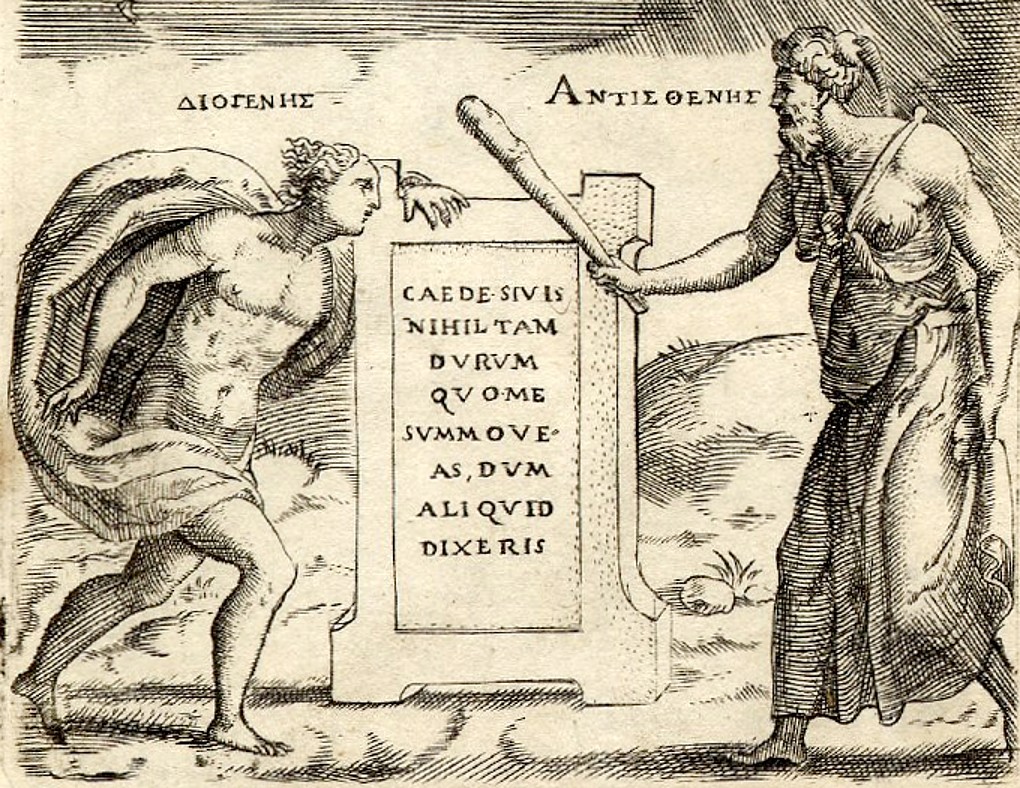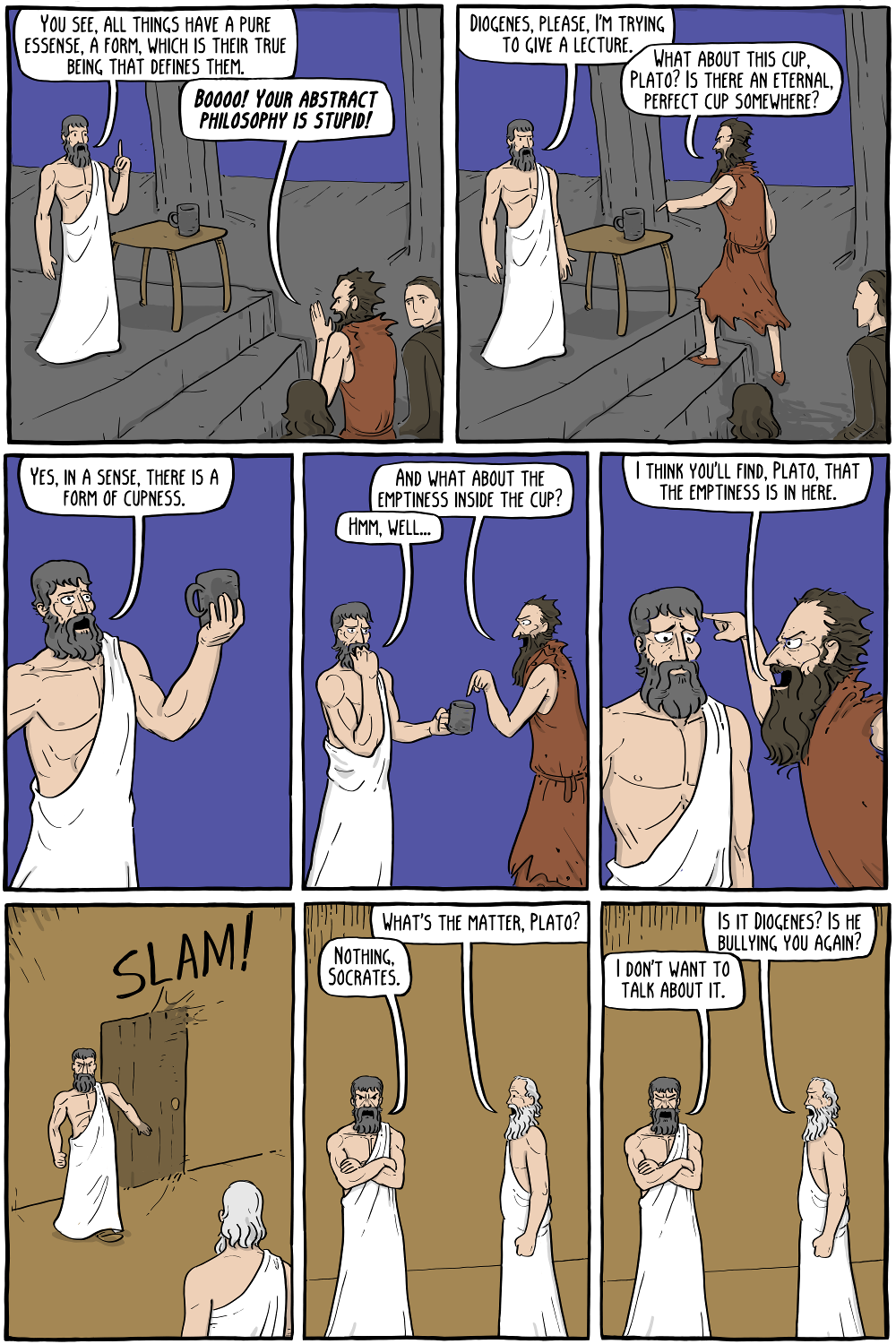
Diogenes (aprox. 412-323 BC), aka Diogenes the Cynic, or kynikos / dog (σκύλος), was by far the truest and most radical pre-Christian Greek philosopher, regarded as a pioneer of the Cynic Philosophy – a Zen-like non-School of anti-Philosophy expounding and embracing an ascetic and transcendental nihilism.
Imagine
The legend goes on with Diogenes walking the streets, almost naked, with long hair and a beard carrying a lamp/lantern in full daylight; when asked what he was doing, he would answer:
“I am just looking for an honest / righteous man.”
“Defacing the currency”
He lived as a beggar in the streets of Athens (was exiled from Sinope, Black Sea coast of modern-day Turkey), sleeping, and eating wherever he chose (by the temple of Cybele), making a virtue of his extreme poverty.
He believed that virtue (the goal of most Greek philosophers but an irrelevance to consumer-societies) could be attained only by fighting hypocrisy, greed, luxury, and corruption (conventional morality). He honed himself into the position of having nothing to lose but life itself. On the other hand, Socrates-Plato had quite a lot to lose – reputation.
Reputation- (valued by patriarchal societies-which depend on female and other servilities) is a very fragile thing to want. But few people realize it.

He was attracted by the Ascetic teaching of Antisthenes, a student of Socrates, becoming his pupil and rapidly surpassing him.
Avoiding all earthly pleasures, he criticized the social values and institutions of what he saw as a corrupt, confused society, and openly disdained self-deception, and the artificiality of much human conduct.
He took to toughening himself against nature and maybe the first to declare himself a cosmopolitan and a citizen of the world.
When asked what was the right age for marriage, Diogenes replied:
“For a young man, not yet; for an old man, not at all.”

In any event, all our information comes (like our information on Jesus, Lao Tzu, Buddha, etc) second-hand at best, many as anecdotes coming from Roman authors many centuries later, and some, much later again, from Muslims who saw Diogenes as a proto-Sufi.
Diogenes has had more – and much more continuing – influence in Islamic culture than in the Christian and post-Christian world-view.
Diogenes of Sinope was contemporary and often an adversary of Plato. He disputed his interpretation of Socrates, and sabotaged his lectures, sometimes distracting listeners by bringing food and eating during the discussions.

Stories of modest living, the essence of mysticism.
One day Diogenes was knee-deep in a stream, washing vegetables. Coming up to him, Plato said:
“My good Diogenes, if you knew how to pay court to kings, you wouldn’t have to wash vegetables.”
Diogenes replied,
“If you knew how to wash vegetables, you wouldn’t have to pay court to kings.”
In another story, he mocks Alexander the Great – Alexander would have been twenty at the time, and Diogenes would have been around seventy.
Thrilled to meet the famous philosopher, Alexander asked if there was any favor he might do for him. Diogenes was relaxing in the morning sunlight and replied, “Yes, stand out of my sunlight.” / “Don’t deprive me of what you cannot give me”

Alexander then declared,
“If I were not Alexander, then I should wish to be Diogenes.”
“If I were not Diogenes, I would still wish to be Diogenes.”
“Mystical experience is
chemicals in brains.
God is dogshit on your shoe.
What’s so wonderful with living?
Nothing that we’re told is true.“
–Hymn to Diogenes
One time, he was captured by pirates and sold as a slave.
When being asked his trade, he replied that he knew no trade but that of governing men and that he wished to be sold to a man who needed a master.
:)) Imagine this dimension!!
A Socrates Gone Mad
In his anti-Platonic insistence that reason should replace authority in guiding human affairs, and his vision of a free community without government, Diogenes can also be considered a proto-Anarchist.
All of Diogenes’s writings disappeared but luckily he managed to passe his philosophy of Cynicism to Crates, who taught it to Zeno of Citium, who fashioned it into the school of Stoicism.
Dog Morality
The ‘defacing of currency’ is an influence much older than that of the cynics; ancient ancient ancient practice.
“Is it true, Diogenes, that you have been doing lewd acts in public and within your barrel?” Diogenes was asked, “I only wish that I could cure my hunger too, just by rubbing my belly.”
Diogenes claimed to have gotten his morality from a dog, and would supposedly really bite at people’s ankles. He said:
The dog is honest; he is not impressed by grand words, fancy clothes, or titles. He is loyal to those who are good to him; he bites those who ill-treat him or his friends, and he’s not embarrassed to do what he does to live.
The objective of Cynicism was spiritual self-sufficiency, integrity, and self-control (autarkeia), and the Cynic virtues were qualities through which true freedom was attained. The most important virtue was impassive unattachment, which, obviously, had to be attained through self-training.
There is something of the Zen and the Tibetan Master about Diogenes. He was a special kind of urban hermit – a privileged Street Person living ascetically but publicly – the opposite of the Christian hermits. He learned early on one of the fundamental principles of ‘The Good Life‘, namely ascetic frugality: less is more!
My favorite story surrounding Diogenes’ death is that he had held his breath until he expired.
:))
Extended Mind Vibrations
In winter Diogenes walked barefoot in the snow. In summer he rolled in the hot sand. He did this to harden himself against discomfort.
When asked: “But aren’t you overdoing it a little?” he replied:
“Of course, I am like a teacher of choruses who has to sing louder than the rest in order they may get the right note.”
Notes: